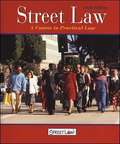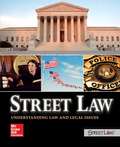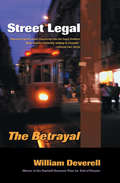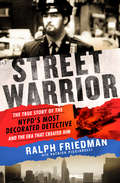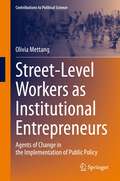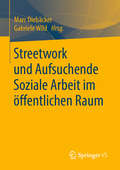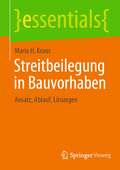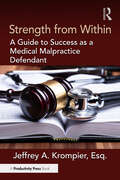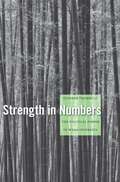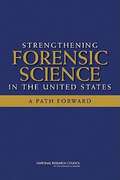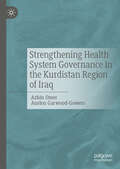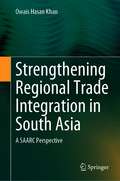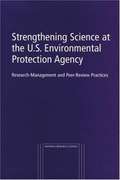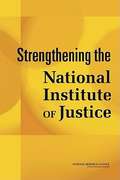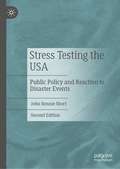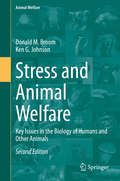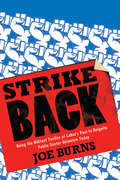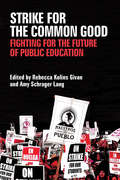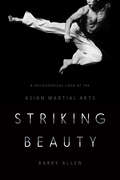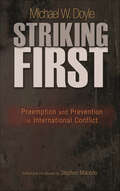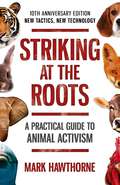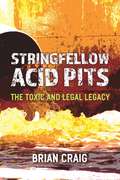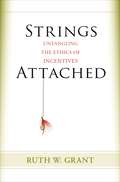- Table View
- List View
Street Law: A Course in Practical Law (Sixth Edition)
by Lee P. Arbetman Edward L. O'BrienThe sixth edition of Street Law: A Course in Practical Law provides new information, practical advice, and competency-building activities designed to provide students with the ability to analyze, evaluate, and, in some situations, resolve legal disputes.
Street Law: Understanding Law And Legal Issues
by McGraw-Hill EducationStreet Law: Understanding Law and Legal Issues is an informative law-based text about people, government, law and community in America. Street Law students will develop a practical understanding of the U. S. legal system and prepare for active community participation in our diverse 21st century democracy by learning essential legal principles for daily living. Street Law is a student text that also serves as a community guide to civic involvement by providing practical information about areas of the law that affect the daily lives of all Americans and U. S. residents. Particularly relevant are the areas of consumer, housing, family, and employment law, along with marriage, and parental rights. As students transition from living with their parents to living on their own or even starting their own families, basic awareness of Street Law subjects will become important in their lives to promote healthy inquiry about public policy and the law. Includes: print student edition
Street Legal: The Betrayal
by William DeverellA Toronto lawyer defends a hit man as the Midnight Strangler stalks the city in a legal thriller based on the author&’s popular CBC drama Street Legal. Toronto, 1980. Three ambitious young lawyers are out to make a name for themselves with their own practice. Chuck Tchobanian and Leon Robinovitch are testing the boundaries of free speech with a pair of controversial cases. Carrie Barr, fresh from her success defending a drifter charged as the notorious Midnight Strangler, takes the most dangerous case of all: a suave hit man who proves to be far more dangerous—and alluring—than she imagined. Soon Carrie finds herself drawn into a web of terror as a rogue police operation, a ruthless drug lord, and a series of brutal murders threaten to tear the fledgling firm apart. Meanwhile, the Midnight Strangler is still at large . . . and may have chosen Carrie as his next victim. Novelist and criminal lawyer William Deverell won the Dashiell Hammett Prize and two Arthur Ellis Awards for his gritty legal thrillers. Street Legal: The Betrayal is based on Deverell&’s long-running Canadian crime drama Street Legal, which was revived with a new cast in 2019.
Street Stories: The World of Police Detectives
by Robert JackallDetectives work the streets--an arena of action, vice, lust, greed, aggression, and violence--to gather shards of information about who did what to whom. They also work the cumbersome machinery of the justice system--semi-military police hierarchies with their endless jockeying for prestige, procedure-driven district attorney offices, and backlogged courts--transforming hard-won street knowledge into public narratives of responsibility for crime. Street Stories, based on years of fieldwork with the New York City Police Department and the District Attorney of New York, examines the moral ambiguities of the detectives' world as they shuttle between the streets and a bureaucratic behemoth. In piecing together street stories to solve intriguing puzzles of agency and motive, detectives crisscross the checkerboard of urban life. Their interactions in social strata high and low foster cosmopolitan habits of mind and easy conversational skills. And they become incomparable storytellers. This book brims with the truth-is-stranger-than-fiction violence of the underworld and tells about a justice apparatus that splinters knowledge, reduces life-and-death issues to arcane hair-splitting, and makes rationality a bedfellow of absurdity. Detectives' stories lay bare their occupational consciousness--the cunning and trickery of their investigative craft, their self-images, moral rules-in-use, and judgments about the players in their world--as well as their personal ambitions, sensibilities, resentments, hopes, and fears. When detectives do make cases, they take satisfaction in removing predators from the streets and helping to ensure public safety. But their stories also illuminate dark corners of a troubled social order.
Street Warrior: The True Story of the NYPD's Most Decorated Detective and the Era That Created Him
by Patrick Picciarelli Ralph Friedman2,000 arrests. 100 off-duty arrests. 6,000 assists. 15 shootings. 8 shot. 4 kills. These are not the performance statistics of an entire NYPD unit. They are the record that makes Detective 2nd Grade Ralph Friedman a legend. Friedman was arguably the toughest cop ever to wear the shield and was the most decorated detective in the NYPD’s 170-year history. Stationed at the South Bronx’s notorious 41 Precinct, known by its nickname “Fort Apache,” Friedman served during one of the city’s most dire times: the 1970s and ‘80s, when fiscal crisis, political disillusionment, an out-of-control welfare system, and surging crime and drug use were just a few of its problems. Street Warrior tells an unvarnished story of harrowing vice and heroic grit, including Friedman’s reflections on racial profiling, confrontations with the citizens he swore to protect, and the use of deadly force.
Street-Level Workers as Institutional Entrepreneurs: Agents of Change in the Implementation of Public Policy (Contributions to Political Science)
by Olivia MettangIntroducing the institutional logics perspective to street-level analysis, this book examines how street-level workers deal with the institutional logics that guide their organization – whether they follow or challenge them. While doing so, the book develops a theoretical framework to study street-level workers’ institutional agency within organizations from different institutional backgrounds. The book conceptualizes street-level workers as institutional entrepreneurs and presents an original process model to capture deinstitutionalization efforts in street-level discourse. This ordinal model accounts for embedded agency and institutional entrepreneurship as well as for more gradual moves towards deinstitutionalization through the hybridization of institutional logics. The author tests the model empirically using interview data and discusses how street-level workers diverge from the institutional logic of their organization in almost two thirds of their statements, indicating a tendency towards institutional entrepreneurship. The book finally combines two literature strands: institutionalism and implementation research, showing how street-level workers may be perceived as institutional entrepreneurs.This book will appeal to students, scholars, and researchers of political science, public policy, public administration, and organizational studies, as well as to practitioners and policy-makers interested in a better understanding of institutional entrepreneurs, street work, and the institutional logics perspective.
Streetwork und Aufsuchende Soziale Arbeit im öffentlichen Raum
by Marc Diebäcker Gabriele WildAufsuchende Ansätze wurden in den letzten Jahrzehnten quantitativ ausgeweitet und häufig mit niederschwelliger Einrichtungsarbeit kombiniert. Soziale Arbeit auf der Straße verändert sich vielerorts aber auch qualitativ, da sie durch weitreichende Veränderungen im urbanen Raum und intensivierte Sicherheits- und Ordnungspolitik fachlich herausgefordert wird. In dem Sammelband werden ausgehend von jeweils zwei Leitbegriffen konzeptionelle und praktische Entwicklungen im Feld kritisch diskutiert. 20 Autor*innen spannen in 17 Beiträgen den Bogen von Kontaktaufbau, niederschwelliger Beratung, Konfliktbearbeitung, Ressourcenorientierung und Alltagsbewältigung bis hin zu Schutzräumen und virtuellen Räumen. Handlungsfeldübergreifende Zugänge und fachliche Prinzipien von Aufsuchender Sozialer Arbeit werden herausgearbeitet; konkrete Fallbeispiele z.B. aus der Jugendarbeit, Suchthilfe oder Stadtteilarbeit illustrieren die Beiträge. Aktuelle Debatten rund um Demokratie, Sicherheiten, Gentrifizierung oder Wohnen, aber auch `Klassiker’ wie Bildung und Prävention werden für die Aufsuchende Soziale Arbeit in öffentlichen Räumen neu kontextualisiert. So können gegenwärtige Anforderungen, Interessenskonflikte und Widersprüche einer professionellen Praxis erschlossen und fachliche Perspektiven entwickelt werden.
Streitbeilegung in Bauvorhaben: Ansatz, Ablauf, Lösungen (essentials)
by Mario H. KrausBauvorhaben führen nicht selten zu Streitigkeiten zwischen Bauherren, Bauträgern, Behörden oder der Nachbarschaft. Dieser Leitfaden verhilft zu einem Überblick über Möglichkeiten der außer- und vorgerichtlichen Streitbeilegung - mit Checklisten, Adressen, Arbeitsansätzen und Verweisen auf die Rechtsgrundlagen.
Strength from Within: A Guide to Success as a Medical Malpractice Defendant
by Jeffrey A. KrompierNow that COVID-19 is behind us and the unprecedented public support for healthcare providers has waned, it is anticipated that physicians and nurses will again become malpractice defendants to a remarkable degree. In fact, the post-COVID-19 surge in lawsuits against medical and nursing professionals is likely to continue for the foreseeable future.Presented here is a comprehensive review of what a newly named defendant can expect as well as how best to assist in the matter’s defense from inception through trial. This book will provide an education about the litigation process and help the defendant succeed under difficult circumstances. Ultimately, it will serve as a source of strength when feelings of weakness, doubt, frustration, and anger surface.
Strength in Numbers: The Political Power Of Weak Interests
by Gunnar TrumbullMany consumers feel powerless in the face of big industry’s interests. And the dominant view of economic regulators (influenced by Mancur Olson’s book The Logic of Collective Action, published in 1965) agrees with them. According to this view, diffuse interests like those of consumers are too difficult to organize and too weak to influence public policy, which is determined by the concentrated interests of industrial-strength players. Gunnar Trumbull makes the case that this view represents a misreading of both the historical record and the core logic of interest representation. Weak interests, he reveals, quite often emerge the victors in policy battles. Based on a cross-national set of empirical case studies focused on the consumer, retail, credit, pharmaceutical, and agricultural sectors, Strength in Numbers develops an alternative model of interest representation. The central challenge in influencing public policy, Trumbull argues, is not organization but legitimation. How do diffuse consumer groups convince legislators that their aims are more legitimate than industry’s? By forging unlikely alliances among the main actors in the process: activists, industry, and regulators. Trumbull explains how these “legitimacy coalitions” form around narratives that tie their agenda to a broader public interest, such as expanded access to goods or protection against harm. Successful legitimizing tactics explain why industry has been less powerful than is commonly thought in shaping agricultural policy in Europe and pharmaceutical policy in the United States. In both instances, weak interests carried the day.
Strengthening Forensic Science in the United States: A Path Forward
by National Research Council of the National AcademiesFor multi-user PDF licensing, please contact mailto:customer_service@nap.edu customer service. Scores of talented and dedicated people serve the forensic science community, performing vitally important work. However, they are often constrained by lack of adequate resources, sound policies, and national support. It is clear that change and advancements, both systematic and scientific, are needed in a number of forensic science disciplines to ensure the reliability of work, establish enforceable standards, and promote best practices with consistent application. Strengthening Forensic Science in the United States: A Path Forward provides a detailed plan for addressing these needs and suggests the creation of a new government entity, the National Institute of Forensic Science, to establish and enforce standards within the forensic science community. The benefits of improving and regulating the forensic science disciplines are clear: assisting law enforcement officials, enhancing homeland security, and reducing the risk of wrongful conviction and exoneration. Strengthening Forensic Science in the United States gives a full account of what is needed to advance the forensic science disciplines, including upgrading of systems and organizational structures, better training, widespread adoption of uniform and enforceable best practices, and mandatory certification and accreditation programs. While this book provides an essential call-to-action for congress and policy makers, it also serves as a vital tool for law enforcement agencies, criminal prosecutors and attorneys, and forensic science educators.
Strengthening Health System Governance in the Kurdistan Region of Iraq
by Austen Garwood-Gowers Azhin OmerThis book is a nuanced study of healthcare provision and health systems governance in the Kurdistan Region in Iraq (KRI). The authors address an important knowledge gap, offering compelling insights into health systems and governance in Kurdistan before and after the start of the Covid-19 pandemic. The findings stem from a system of benchmarking derived from both a comparative analysis of international healthcare standards and original empirical research. In light of the benchmarks of best practices for health system governance and the findings from in-depth qualitative interviews, the authors critically discuss the strengths and weaknesses in KRI healthcare governance and put forward pathways for reform. This thought-provoking book contributes to an important area of research on contemporary health systems governance and healthcare provision in low-income countries and war-affected regions.
Strengthening Regional Trade Integration in South Asia: A SAARC Perspective
by Owais Hasan KhanThis book brings forth the philosophical, conceptual and practical contours of the trade regionalism provisions under the GATT/WTO. It analyses SAARC as the regional integration organisation of South Asia along with identifying major challenges and bottlenecks faced by it in the process of achieving regional integration. It presents ways and methods through which SAARC can be made a more effective regional organisation. The book predominantly focuses on trade regionalism. However, other areas of integration which have impacts on the trade regionalism are also examined like social and political integrations etc. The book takes off from the premise that trade regionalism under SAARC has failed and has been marred by political and security concerns among its member nations. It has failed to achieve its objective on all the three counts, which are promoting peace, development and economic cooperation. However, with the developing countries as members, SAARC has great potential for trade integration. Certain structural, normative and organisation alteration along with favourable ideation can still make SAARC achieve its full potential. The book also deals with the comparative analysis of SAARC regional integration with the regional integration under European Union and ASEAN. Regarding comparative regionalism, the discussion has been confined only to the EU and ASEAN. The EU has been chosen because it is comparatively established as one of the most successful regional organisations in the contemporary world. Whereas, ASEAN has been chosen because of its similarity to the SAARC’s economy, society and political structure. The analysis presented in the book is from the perspectives of international law and international relations’ theories and practise. This book thus is of particular relevance to the students, researchers, academicians, policymakers and practitioners of international trade law, international relations and South Asian studies.
Strengthening Science at the U.S. Environmental Protection Agency: Research-Management and Peer-Review Practices
by Committee on Research Peer Review in EPAInformation on Strengthening Science at the U.S. Environmental Protection Agency
Strengthening the National Institute of Justice
by National Research Council of the National AcademiesThe National Institute of Justice (NIJ) is the nation's primary resource for advancing scientific research, development, and evaluation on crime and crime control and the administration of justice in the United States. Headed by a presidentially appointed director, it is one of the major units in the Office of Justice Programs (OJP) of the U.S. Department of Justice. Under its authorizing legislation, NIJ awards grants and contracts to a variety of public and private organizations and individuals.At the request of NIJ, Strengthening the National Institute of Justice assesses the operations and quality of the full range of its programs. These include social science research, science and technology research and development, capacity building, and technology assistance. The book concludes that a federal research institute such as NIJ is vital to the nation's continuing efforts to control crime and administer justice. No other federal, state, local, or private organization can do what NIJ was created to do. Forty years ago, Congress envisioned a science agency dedicated to building knowledge to support crime prevention and control by developing a wide range of techniques for dealing with individual offenders, identifying injustices and biases in the administration of justice, and supporting more basic and operational research on crime and the criminal justice system and the involvement of the community in crime control efforts. As the embodiment of that vision, NIJ has accomplished a great deal. It has succeeded in developing a body of knowledge on such important topics as hot spots policing, violence against women, the role of firearms and drugs in crime, drug courts, and forensic DNA analysis. It has helped build the crime and justice research infrastructure. It has also widely disseminated the results of its research programs to help guide practice and policy. But its efforts have been severely hampered by a lack of independence, authority, and discretionary resources to carry out its mission.
Stress Testing the USA: Public Policy and Reaction to Disaster Events
by John Rennie ShortStress tests highlight a system’s weak spots. This second edition provides a stress testing of the United States by exploring in detail the background to the disasters of the War on Terror, Hurricane Katrina, the financial crisis, the Gulf oil spill and the COVID-19 epidemic. These major stresses—the country’s longest war, its biggest natural disaster, its biggest financial collapse since the Great Depression, its biggest oil spill and its worst pandemic since the influenza pandemic of 1918—tell us much about structural flaws in the United States. This book explores each of these events in detail to locate the seed of the disasters, and highlights what we have learned and not learned from these stress tests.
Stress and Animal Welfare: Key Issues in the Biology of Humans and Other Animals (Animal Welfare #19)
by Donald M. Broom Ken G. JohnsonThis is the Second Edition of a well-received book that reflects a fresh, integrated coverage of the concepts and scientific measurement of stress and welfare of animals including humans. This book explains the basic biological principles of coping with many forms of adversity. The major part of this work is devoted to explaining scientifically usable concepts in stress and welfare. A wide range of welfare indicators are highlighted in detail with examples being drawn from man and other species. The necessity for combining information from disciplines is emphasized with a one-health, one-welfare approach. This information forms the basis for a synthesis of new ideas. Among the issues covered are:- How brain and body systems regulate using feelings, physiological responses, behaviour and responses to pathology- Limits to adaptation- Assessing positive and negative welfare during both short-term and long-term situations- Ethical problems and suggested solutionsA proper assessment of animal welfare is essential to take informed decisions about what is morally acceptable in terms of practice and in the development of a more effective legislation. This work encapsulates a very wide body of literature on scientific aspects of animal welfare and will thus prove a valuable asset for animal welfare scientists, psychologists, students and teachers of all forms of biology, behaviour, medicine, veterinary medicine and animal usage.
Strike Back
by Joe BurnsDuring the 1960s and 1970s, teachers, sanitation workers and many other public employees rose up to demand collective bargaining rights in one of the greatest upsurges in labor history. These workers were able to transform the nature of public employment, winning union recognition for millions and ultimately forcing reluctant politicians to pass laws allowing for collective bargaining and even the right to strike. Strike Back uncovers this history of militancy to provide tactics for a new generation of public employees facing unprecedented attacks on their labor rights.
Strike for the Common Good: Fighting for the Future of Public Education (Class : Culture)
by Amy Schrager Lang Rebecca Kolins GivanIn February 2018, 35,000 public school educators and staff walked off the job in West Virginia. More than 100,000 teachers in other states—both right-to-work states, like West Virginia, and those with a unionized workforce—followed them over the next year. From Arizona, Kentucky, and Oklahoma to Colorado and California, teachers announced to state legislators that not only their abysmal wages but the deplorable conditions of their work and the increasingly straitened circumstances of public education were unacceptable. These recent teacher walkouts affirm public education as a crucial public benefit and understand the rampant disinvestment in public education not simply as a local issue affecting teacher paychecks but also as a danger to communities and to democracy. Strike for the Common Good gathers together original essays, written by teachers involved in strikes nationwide, by students and parents who have supported them, by journalists who have covered these strikes in depth, and by outside analysts (academic and otherwise). Together, the essays consider the place of these strikes in the broader landscape of recent labor organizing and battles over public education, and attend to the largely female workforce and, often, largely non-white student population of America’s schools.
Striking Beauty
by Barry AllenThe first book to focus on the intersection of Western philosophy and the Asian martial arts, Striking Beauty collapses the boundaries between Eastern and Western thought, comparatively studying the historical and philosophical traditions of martial arts practice and their ethical value in the modern world. Expanding Western philosophy's global outlook, the book forces a theoretical reckoning with the concerns of Chinese philosophy and the aesthetic and technical dimensions of martial arts practice. Striking Beauty explains the relationship between Asian martial arts and the Chinese philosophical traditions of Confucianism, Buddhism, and Daoism in addition to the strategic wisdom of Sunzi's Art of War. It connects martial arts practice to the Western concepts of mind-body dualism and materialism, sports aesthetics, and the ethics of violence. Incorporating innovations in body phenomenology, somaesthetics, and embodied cognition, the work ameliorates Western philosophy's hostility toward the body, emphasizing the pleasure of watching and engaging in martial arts, along with their beauty and the ethical problem of their violence.
Striking Beauty: A Philosophical Look at the Asian Martial Arts
by Barry AllenThe first book to focus on the intersection of Western philosophy and the Asian martial arts, Striking Beauty comparatively studies the historical and philosophical traditions of martial arts practice and their ethical value in the modern world. Expanding Western philosophy's global outlook, the book forces a theoretical reckoning with the concerns of Chinese philosophy and the aesthetic and technical dimensions of martial arts practice.Striking Beauty explains the relationship between Asian martial arts and the Chinese philosophical traditions of Confucianism, Buddhism, and Daoism, in addition to Sunzi's Art of War. It connects martial arts practice to the Western concepts of mind-body dualism and materialism, sports aesthetics, and the ethics of violence. The work ameliorates Western philosophy's hostility toward the body, emphasizing the pleasure of watching and engaging in martial arts, along with their beauty and the ethical problem of their violence.
Striking First: Preemption and Prevention in International Conflict (The University Center for Human Values Series #38)
by Michael W. DoyleDoes the United States have the right to defend itself by striking first, or must it wait until an attack is in progress? Is the Bush Doctrine of aggressive preventive action a justified and legal recourse against threats posed by terrorists and rogue states? Tackling one of the most controversial policy issues of the post-September 11 world, Michael Doyle argues that neither the Bush Doctrine nor customary international law is capable of adequately responding to the pressing security threats of our times. In Striking First, Doyle shows how the Bush Doctrine has consistently disregarded a vital distinction in international law between acts of preemption in the face of imminent threats and those of prevention in the face of the growing offensive capability of an enemy. Taking a close look at the Iraq war, the 1998 attack against al Qaeda in Afghanistan, and the Cuban Missile Crisis, among other conflicts, he contends that international law must rely more completely on United Nations Charter procedures and develop clearer standards for dealing with lethal but not immediate threats. After explaining how the UN can again play an important role in enforcing international law and strengthening international guidelines for responding to threats, he describes the rare circumstances when unilateral action is indeed necessary. Based on the 2006 Tanner Lectures at Princeton University, Striking First includes responses by distinguished political theorists Richard Tuck and Jeffrey McMahan and international law scholar Harold Koh, yielding a lively debate that will redefine how--and for what reasons--tomorrow's wars are fought.
Striking at the Roots: New Tactics, New Technology
by Mark HawthorneA major revision of animal rights bible Striking at the Roots, referencing changes from the last 10 years including the rise of social media, which is now a key part of any campaign. The book brings together the most effective tactics for speaking out for animal rights. Activists from around the globe explain why their models of activism have been successful - and how you can become involved. Concise and full of practical examples and resources, this manual for success demonstrates how many of the world's most engaged activists effectively speak to the public, lobby policymakers, and deal with law enforcement - all while keeping their eyes on the prize of achieving victories for animals. This book will empower you to make the most of your skills. From simple leafleting to taking direct action, each chapter clearly explains where to begin, what to expect, and how to ensure your message is heard.
Stringfellow Acid Pits: The Toxic and Legal Legacy
by Brian CraigStringfellow Acid Pits tells the story of one of the most toxic places in the United States, and of an epic legal battle waged to clean up the site and hold those responsible accountable. In 1955, California officials approached rock quarry owner James Stringfellow about using his land in Riverside County, east of Los Angeles, as a hazardous dump site. Officials claimed it was a natural waste disposal site because of the impermeable rocks that underlay the surface. They were gravely mistaken. Over 33 million gallons of industrial chemicals from more than a dozen of the nation’s most prominent companies poured into the site’s unlined ponds. In the 1960s and 1970s, heavy rains forced surges of chemical-laden water into Pyrite Creek and the nearby town of Glen Avon. Children played in the froth, making fake beards with the chemical foam. The liquid waste contaminated the groundwater, threatening the drinking water for hundreds of thousands of California residents. Penny Newman, a special education teacher and mother, led a grassroots army of so-called “hysterical housewives” who demanded answers and fought to clean up the toxic dump. The ensuing three-decade legal saga involved more than 1,000 lawyers, 4,000 plaintiffs, and nearly 200 defendants, and led to the longest civil trial in California history. The author unveils the environmental and legal history surrounding the Stringfellow Acid Pits through meticulous research based on personal interviews, court records, and EPA and other documents. The contamination at the Stringfellow site will linger for hundreds of years. The legal fight has had an equally indelible influence, shaping environmental law, toxic torts, appellate procedure, takings law, and insurance coverage, into the present day.
Strings Attached: Untangling the Ethics of Incentives
by Ruth W. GrantThe legitimate and illegitimate use of incentives in society todayIncentives can be found everywhere—in schools, businesses, factories, and government—influencing people's choices about almost everything, from financial decisions and tobacco use to exercise and child rearing. So long as people have a choice, incentives seem innocuous. But Strings Attached demonstrates that when incentives are viewed as a kind of power rather than as a form of exchange, many ethical questions arise: How do incentives affect character and institutional culture? Can incentives be manipulative or exploitative, even if people are free to refuse them? What are the responsibilities of the powerful in using incentives? Ruth Grant shows that, like all other forms of power, incentives can be subject to abuse, and she identifies their legitimate and illegitimate uses.Grant offers a history of the growth of incentives in early twentieth-century America, identifies standards for judging incentives, and examines incentives in four areas—plea bargaining, recruiting medical research subjects, International Monetary Fund loan conditions, and motivating students. In every case, the analysis of incentives in terms of power yields strikingly different and more complex judgments than an analysis that views incentives as trades, in which the desired behavior is freely exchanged for the incentives offered.Challenging the role and function of incentives in a democracy, Strings Attached questions whether the penchant for constant incentivizing undermines active, autonomous citizenship. Readers of this book are sure to view the ethics of incentives in a new light.
